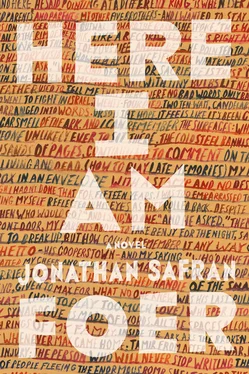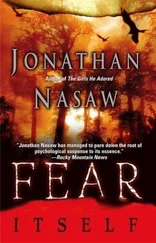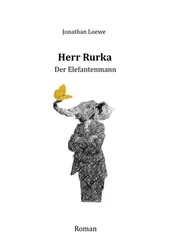Packing up his things had been emotionally easier than Jacob had imagined, but the logistics were surprisingly fraught. The problem wasn’t the volume of things — despite having accumulated things for sixteen years, there was a surprising scarcity of things. The problem — at the end of the day, at the end of the end of their marriage — was addressing the question of what makes something yours and not someone else’s. How did life reach the point where that question mattered? And what took life so long?
If he’d known that he was going to get divorced, he would have better set the table for the end — bought one of those old-fashioned “Library of Jacob Bloch” embossers and marked the title page of every book; perhaps stashed away money in small, unnoticeable increments; started moving things whose absence would never be noticed, but whose presence in his new home would make a real difference.
It was scary how quickly and completely his past could be rewritten, or overwritten. All those years felt worthwhile while they were happening, but only a few months on the other side of them and they were a gigantic waste of time. Of a life. It was an almost irrepressible urge of his brain to see the worst in that which had failed. To see it as something that had failed, rather than something that had succeeded until the end. Was he protecting himself from the loss by denying anything was lost? Or simply achieving some pathetic emotional nonvictory by not caring?
When a friend would express sympathy, why did Jacob insist on opposing it? Why did he have to turn his decade and a half of marriage into stupid puns and ironic observations? Why couldn’t he express to a single person — to himself — that even if he understood that divorce was the right thing to do, even if he was hopeful about the future, even if there was happiness ahead, it was sad? Things can be for the best and the worst at the same time.
* * *
Three days after returning to Israel, Tamir e-mailed Jacob from an outpost in the Negev, where his tank unit was awaiting its next order: “Today I fired a gun, and my son fired a gun. I never doubted the rightness of my firing a weapon to defend my home, or of Noam doing so. But the fact of us both doing it on the same day cannot be right. Can you understand that?”
“You drive the tank?” Jacob asked.
“Did you read what I wrote?”
“I’m sorry. I don’t know what to say.”
“I reload the ammunition.”
Five days later, as they turned to the bookshelves to say Kaddish, Irv said, “So listen,” and Jacob knew something had happened. And more, he knew it was Noam. He hadn’t seen it coming, but like someone watching the tracks from the back of a train, he saw that it couldn’t have been any other way.
Noam had been injured. Critically, but not fatally. Rivka was with him. Tamir was on his way.
“How did you find out?” Jacob asked.
“Tamir called me last night.”
“Did he ask you to tell me?”
“I think I’m a kind of father figure to him.”
Jacob’s first instinct was to suggest they go to Israel. He wouldn’t get on the plane to fight beside his cousin, but he would go to sit at his cousin’s son’s bedside and offer the kind of strength that involves only heart muscle.
Tamir’s first instinct was to cling to Rivka. If someone had told him, a month or year or decade earlier, that Noam would be wounded in a war, he would have predicted the end of his marriage. And yet when the unimaginable happened, it was just the opposite of what he’d imagined.
When the house shook with the middle-of-the-night knocking against the door, Tamir was at a forward operating base near Dimona; his commander woke him with the news. Later, he and Rivka would try to pinpoint the exact moment that each learned of what happened, as if something profound depended on who knew first, and what the amount of time was that one parent knew and the other still believed Noam to be OK. For those first five or thirty minutes, there would have existed a greater distance between them than the one that separated them before they met. Perhaps if Tamir had been home, the shared experience would have driven them apart, into competitive suffering, misplaced fury, blame. But the apartness drew them together.
How many times, in those first weeks, did he enter the room and stand by the door, unable to speak? How many times did she ask, “Do you need anything?”
And he would say, “No.”
And she would say, “Are you sure?”
And he would say, “Yes,” but think, Ask again.
And she would say, “I know,” but think, Come to me.
And he would say, “Ask again.”
And she would say, “Come to me.”
And saying nothing, he would.
There they would be, side by side, her hand on his thigh, his head resting on her chest. If they had been teenagers, it would have looked like the beginning of love, but they’d been married for twenty years, and it was the exhumation of love.
After being informed of Noam’s injury, Tamir was given a week’s leave. He was with Rivka at the hospital three hours later, and when darkness fell, they were told they had to go home. Rivka instinctively went to sleep in the guest room. In the middle of the night, Tamir entered and stood by the door.
“Do you need anything?” she asked.
And he said, “No.”
And she said, “Are you sure?”
And he said, “Yes.”
And she said, “I know.”
And he said, “Ask again.”
And she said, “Come to me,” and saying nothing, he went to her.
He needed the distance to traverse. So she gave it to him. Every night she would go to the guest room. Every night he would come to her.
When Tamir sat with his son’s body, he thought of what Jacob had told him about sitting with Isaac’s body, Max’s desire to be close to it. Noam’s face was misshapen, shades of a purple that appeared nowhere in nature, his cheeks and brow forced together by the swelling. Why isn’t health as shocking as illness, as demanding of prayer? Tamir had been capable of going weeks without speaking to his son, but he wouldn’t willingly leave his son’s unconscious body.
Noam emerged from his coma the day before the cease-fire. It would take time to learn the extent of his injuries: the ways his body would never function as it once did, the psychological damage. He hadn’t been buried alive or burned to death. But he had been broken.
When the cease-fire was signed, there was no celebrating in the streets. There were no fireworks, or passed bottles, or singing from windows. Rivka slept in the bedroom that night. The loving distance they’d found in crisis had closed with peace. Across the country and the world, Jews were already writing editorials blaming other Jews — for lack of preparedness, of wisdom, of ethics, of sufficient force, of help. The prime minister’s coalition collapsed and elections were scheduled. Unable to sleep, Tamir took his phone from the bedside table and wrote a one-sentence text to Jacob: We’ve won, but we’ve lost.
It was nine in the evening in D.C. Jacob was in the Airbnb one-bedroom that he had been renting by the week, three blocks from his sleeping children. He went after putting the kids down and returned before they awoke. They knew he didn’t spend the night at home, and he knew they knew it, but the charade felt necessary. Nothing would be harder for Jacob than this period between houses, which lasted half a year. Everything that was necessary was punishing: the pretending, the extreme early rising, the aloneness.
Jacob’s thumb was constantly pushing his list of contacts, as if some new person might materialize with whom he could share the sadness he couldn’t confess. He wanted to reach out to Tamir, but it was impossible: not after Islip, not after Noam’s injury. So when the text from Tamir came through— We’ve won, but we’ve lost —Jacob was relieved and grateful, but careful about expanding his shame by revealing it.
Читать дальше












